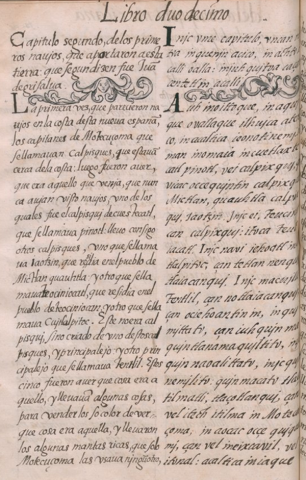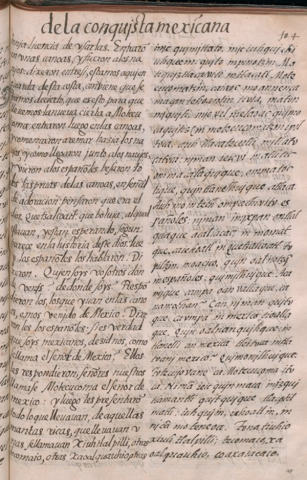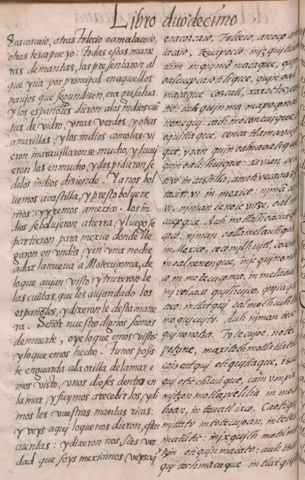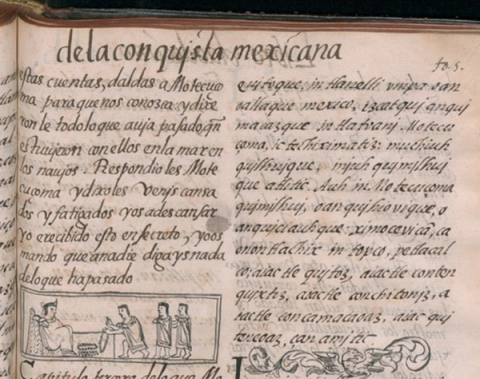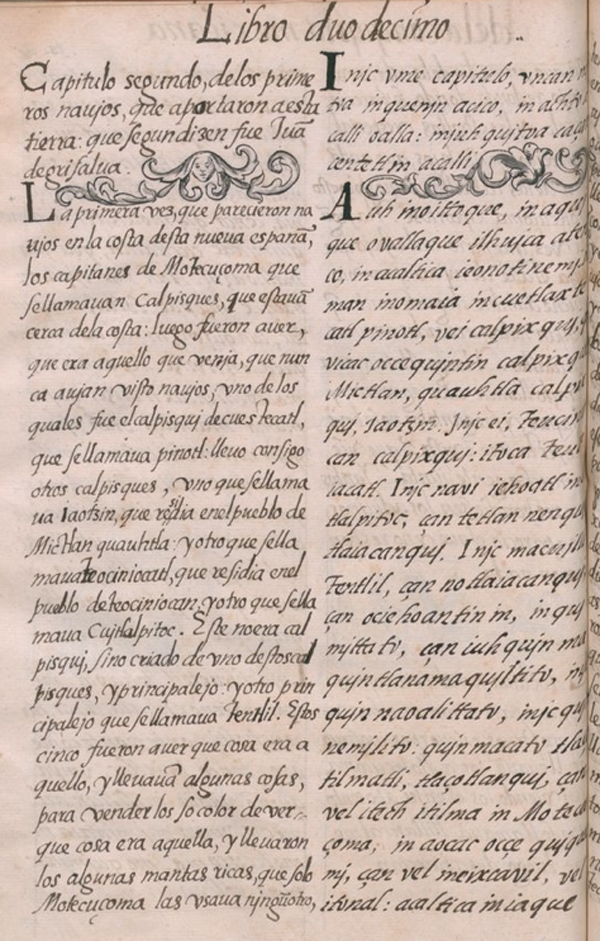 |
[Transcription of the Nahuatl (right-hand column) by James Lockhart:]
[f. 3v.] Inic vme capitulo, vncan mitoa in quenin acico, in achto acalli oalla: in iuh quitoa ca çan centetl inacalli.
Auh in oittoque, in aquique ovallaque ilhuicaatenco,in acaltica ie onotinemi. Niman inoma ia in cuetlaxtecatl pinotl, vei calpixqui, q̓nvicac oc cequintin calpixque: Mictlan, quauhtla calpixqui, Iaotzin. Inic ei, Teuciniocan calpixqui: itoca Teuciniacatl.* Inic navi iehoatl in cuitlalpitoc, çan tetlan nenqui tlaiacanqui. Inic macuilli Tentlil, çanno tlaiacanqui;
çan oc iehoantin in, in quimittato, çan iuhquin maquintlanamaquiltito, inic quinnaoalittato, inic quinnemilito: quinmacato tlaçotilmatli, tlaçotlanqui, çan velitech itilma in Motecuçoma, in aoc ac oc çe quiquemi, çan vel ineixcavil, vel itonal:
acaltica in iaque
----------
*TEUCINIACATL. Read: "Teociniocatl."
|
[Translation of the Nahuatl (right-hand column) by James Lockhart:]
Second chapter, where it is said how the first boat that came arrived; they say that there was only one boat.
When those who came to the seashore were seen, they were going along by boat. Then Pinotl of Cuetlaxtlan, a high steward, went in person, taking other stewards with him: [second], Yaotzin, the steward of Mictlanquauhtla; third, the steward of Teocinyocan, named Teocinyocatl; fourth, Cuitlalpitoc, who was only a dependent, a subordinate leader; and fifth, Tentlil, also a subordinate leader.
These were the only ones who first went to see [the Spaniards]. They went as if to sell them things, so that they could spy on them and contemplate them. They gave them precious cloaks, precious goods, the very cloaks pertaining to Moteucçoma which no one else could don, which were assigned to him alone.
It was by boat that they went
[Translation of the Spanish (left-hand column) by James Lockhart:]
Second chapter, of the first ships that happened on these shores; according to what they say, it was Juan de Grijalva.
The first time that ships appeared on the coast of New Spain here, Moteucçoma's captains, called calpisques, who were near the coast went right away to see what it was that was coming, for they had never seen ships. One of them was the calpisqui of Cuextecatl [of Cuextlan], whose name was Pinotl; he took with him other calpisques, one of whom was named Yaotzin, residing in the settlement of Mictlanquauhtla, and another named Teocinyocatl, residing in the settlement of Teocinyocan, and another named Cuitlalpitoc. The latter was not a calpisqui, but the subordinate of one of these calpisques, and a lower-level leader, along with another low-level leader named Tentlil.
These five went to see what it was, and they took along some things to sell as a pretext for seeing what manner of thing it was. They took some rich cloaks that only Moteucçoma wore, nor did any one else
|
[Translation of the Nahuatl into Spanish by Fr. Bernardino de Sahagún; transcription of the Spanish (left-hand column) by James Lockhart:]
[f. 3v.] Capitulo segundo, de los primeros nauios, que aportaron a esta tierra: que segun dizen fue Juā de grisalua.
La primera vez, que parecieron nauios en la costa desta nueua españa, los capitanes de Motecuçoma que se llamauan calpisques, que estauā cerca de la costa: luego fueron a uer, que era aquello que veia, que nunca auian visto nauios, vno de los quales fue el calpisque de cuestecatl, que se llamaua pinotl: lleuo consigo otros calpisques, vno que se llamaua iaotzin, que residia en el pueblo de Mictlanquauhtla: y otro que se llamaua Teociniocatl, que residia en el pueblo de Teociniocan, y otro que se llamaua Cuitlalpitoc. Este no era calpisque, sino criado de vno destos calpisques, y principalejo; y otro principalejo que se llamaua Tentlil.
Estos cinco fueron a uer que cosa era aquello, y lleuauā algunas cosas, para venderlos so color de ver que cosa era aquella,* y lleuaronlos algunas mantas ricas, que solo Motecuçoma las vsaua ningū otro,
----------
*PARA VENDERLOS SO COLOR DE VER QUE COSA ERA AQUELLA. The phrase is reversed; properly it should say "para ver que cosa era aquella, so color de venderlos [in standard grammar, venderlas]."
|
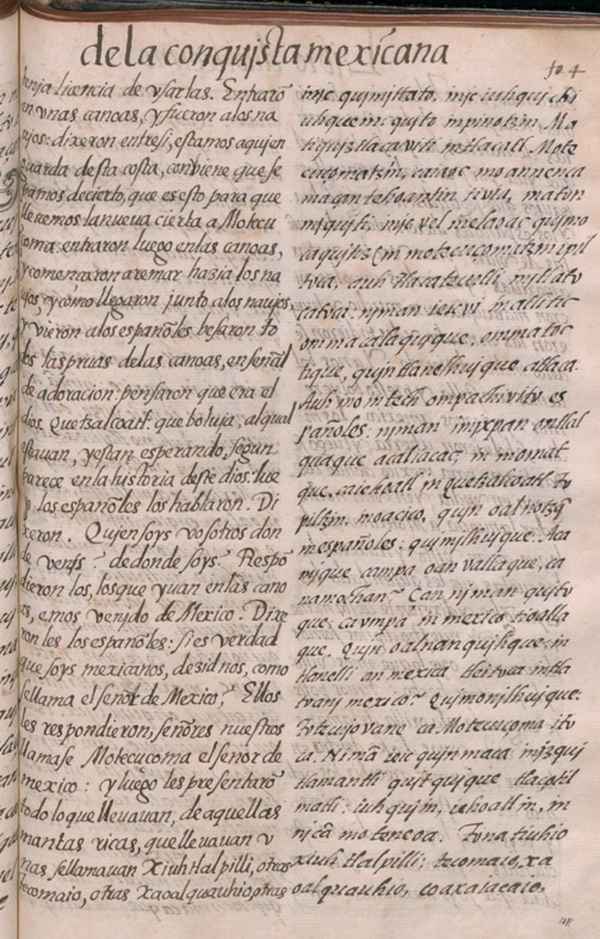 |
[Transcription of the Nahuatl (right-hand column) by James Lockhart:]
[f. 4r.] inic quimittato, inic iuh quichiuhque in: quito in pinotzin. Ma tiquiztlacaviti intlacatl Motecuçomatzin, ca iaocmo annenca ma çan tehoantin tivia, ma tonmiquiti, inic vel melaoac quimocaquitiz (in motecuçomatzin ipiltoca, auh Tlacatecutli initlatocatoca:
niman ie ic vi in atl itic ommacalaquique, ommatoctique, quintlanelhuique atlaca. Auh in o intech ompachivito españoles: niman imixpan ontlalquaque acaliacac, in momatque, ca iehoatl in Quetzalcoatl Topiltzin, in oacico,
quinoalnotzq̄ in españoles: quimilhuique. Acamiquecampa oanvallaque, can amochan?
Çan niman quitoque: ca vmpa in mexico tioallaque.
Quinoalnanquilique: intla nelli anmexica tle itoca in tlatoani mexico?
Quimonilhuique: Totecuiovane ca Motecuçoma itoca.
Nimā ie ic quinmaca in izquitlamantli quitquiquetlaçotilmatli: iuhqui in, iehoatl in, in nicā moteneoa. Tonatiuhio xiuhtlalpilli; tecomaio, xaoalquauhio, coaxaiacaio,
|
[Translation of the Nahuatl (right-hand column) by James Lockhart:]
to see them. As they were doing it, Pinotzin said, “Let us not lie to the lord Moteucçoma, for you would live no longer. Let’s just go, lest we die, so that he can hear the real truth.” (Moteucçoma was his personal name, and Tlacateuctli was his title as ruler.)
Then they embarked, launched off, and went out on the water; the water folk paddled for them. When they approached the Spaniards, they made the earth-eating gesture at the prow of the boat<s>. They thought that it was Quetzalcoatl Topiltzin who had arrived.
The Spaniards called to them, saying to them, “Who are you? Where have you come from? Where is your homeland?”
Immediately they said, “It is from Mexico that we have come.”
They answered them back, “If you are really Mexica, what is the name of the ruler of Mexico?”
They told them, “Oh our lords, Moteucçoma is his name.”
Then they gave them all the different kinds of precious cloaks they carried, to wit, like those mentioned here: the sun-covered style, the blue-knotted style, the style covered with jars, the one with painted eagles, the style with serpent faces,
[Translation of the Spanish (left-hand column) by James Lockhart:]
have permission to use them.
They embarked in some canoes and went to the ships, saying among themselves, "We are here to watch over this coast; we need to know for certain what this is so that we can take a true report to Moteucçoma."
Then they got in the canoes and began to row toward the ships. And when they arrived next to the ships and saw the Spaniards, they all kissed the prows of the canoes as a sign of worship. They thought it was the god Quetzalcoatl who was returning, whom they had been and are expecting, as appears in the history of this god.
Then the Spaniards spoke to them, saying, "Who are you? Where are you coming from? Where is your home?"
Those who were in the canoes answered, "We have come from Mexico."
The Spaniards said to them, "If it is true that you are Mexica, tell us, what is the name of the ruler of Mexico?"
They answered them, "Our lords, the ruler of Mexico is named Moteucçoma."
Then they presented to them everything they had brought. Some of those rich cloaks they had brought were called xiuhtlalpilli, others tecomayo, others xahualquauhyo, others
|
[Translation of the Nahuatl into Spanish by Fr. Bernardino de Sahagún; transcription of the Spanish (left-hand column) by James Lockhart:]
[f. 4r.] tenia licencia de vsarlas.
Entrarō en vnas canoas, y fueron a los nauios: dixeron entre si, estamos aqui en guarda desta costa, conviene que sepamos de cierto, que es esto para que lleuemos la nueua cierta a Motecuçoma:
entraron luego en las canoas, y començaron a remar hazia los nauios, y como llegaron junto a los nauios, y vieron a los españoles besaron todos las pruas de las canoas, en señal de adoración: pensaron que era el dios. Quetzalcoatl: que boluia, al qual estauan, y estan esperando, segun parece en la historia deste dios:*
luego los españoles los hablaron. Dixeron. Quien soys vosotros donde** venis? de donde soys?
Respōdieronlos, los que yuan en las canoas, emos venido de Mexico.
Dixeronles los españoles: si es verdad que soys mexicanos, dezidnos, como se llama el señor de Mexico?
Ellos les respondieron, señores nuestros llamase Motecuçoma el señor de mexico:
y luego les presentaro todo lo que lleuauan, de aquellas mantas ricas, que lleuauan vnas se llamauan xiuhtlalpilli, otras tecomaio, otras xaoalquauhio, otras
----------
*EN LA HISTORIA DESTE DIOS. That is, elsewhere in the Florentine Codex.
**DONDE. For "de donde."
|
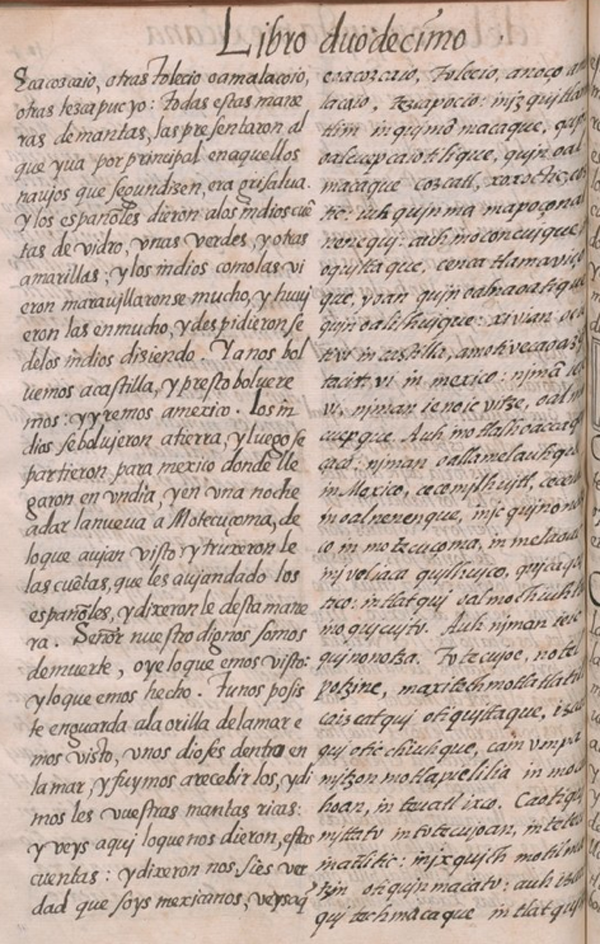 |
[Transcription of the Nahuatl (right-hand column) by James Lockhart:]
[f. 4v.] coacozcaio,* Tolecio,** anoço amalacaio, Tezcapocio:
in izquitlamātli in in quimōmacaque, quinoalcuepcaiotilique, quinoalmacaque cozcatl, xoxoctic, coztic: iuhquin ma mapoçonalnenequi: auh in oconcuique, inoquittaque, cenca tlamaviçoque,
yoan quinoalnaoatique: quinoalilhuique: xivian oc ietivi in castilla, amo tivecaoazq̄ tacitivi in mexico:
nimā ie ic vi, niman ie no ic vitze, oalmocuepque. Auh in o tlalhoacca quiçaco: niman oallamelauhque in Mexico, cecemilhuitl, ceceioal in oalnenenque, inic quinonotzaco in motecuçoma, in melaoac in iveliaca*** quilhuico, quicaquitico: intlatqui oalmochiuhtia in oquicuito.
Auh niman ie ic quinonotza. Totecuioe, notelpotzine, ma xitechmotlatlatili ca iz catqui otiquittaque, iz catqui oticchiuhque, ca in vmpa mitzonmotlapielilia in moculhoan, in teuatl ixco. Ca otiquimittato in totecuioan, inteteu in atl itic: in ixquich motilmatzin otiquinmacato: auh iz catqui techmacaque intlatquitzi.
----------
*COACOZCAIO. The Spanish version's "Ecacozcaio" seems preferable.
**TOLECIO. I provisionally follow Sahagún 1950-1982: 13.6 in the rendering of this form. "Covered with turkey blood," however, ought to have been written "Totolezio." More tempting, if improbable, would be "Toltecaio" 'in Toltec style.'
*** IN IVELIACA. I have neither seen nor hit upon any adequate explanation of this word. The Spanish version suggests “what they had seen,” which also has logic on its side.
|
[Translation of the Nahuatl (right-hand column) by James Lockhart:]
the style with wind jewels, the style with <turkey blood>, or with whirlpools, the style with smoking mirrors.
For all these things that they gave them, [the Spaniards] gave them things in return; they gave them green and yellow strings of beads, which one might imagine to be amber. And when they had taken them and looked at them, greatly did they marvel.
And [the Spaniards] took leave of them, saying to them, “Go off, while we go to Spain; we will not be long in getting to Mexico.”
Thereupon they went, and [the local people] also came away, coming back. And when they came out on dry land, they came straight to Mexico, moving along in this direction day and night to come inform Moteucçoma, to tell him and report to him the truth [. . .]. They took the goods they had received.
Then they spoke to him: “Oh our lord, oh master, destroy us [if you will, but] here is what we have seen and done at the place where your subordinates stand guard for you beside the ocean. For we went to see our lords the gods out on the water; we gave them all your cloaks, and here are the fine things belonging to them that they gave us.
[Translation of the Spanish (left-hand column) by James Lockhart:]
ecacozcayo, others tolecyo or amalacayo, others tezcapocyo. They gave all these kinds of cloaks to the person who went in charge in those ships, who according to what they say was Grijalva.
And the Spaniards gave the Indians glass beads, some of them green and others yellow, and when the Indians saw them they marveled greatly, esteeming them highly.
They took leave of the Indians, saying, "Now we are returning to Castile, but soon we will come back and go to Mexico."
The Indians went back to land, and then they departed for Mexico, where they arrived in a day and a night to give the news to Moteucçoma of what they had seen, and they brought him the beads that the Spaniards had given them.
They spoke to him as follows: "Our lord, we deserve death. Hear what we have seen and what we have done. You set us to watch the seashore; we have seen some gods in the sea, and we went to receive them and gave them your rich cloaks. You see here what they gave us, these beads, and they told us, 'If you are really Mexica, here
|
[Translation of the Nahuatl into Spanish by Fr. Bernardino de Sahagún; transcription of the Spanish (left-hand column) by James Lockhart:]
[f. 4v.] Ecacozcaio, otras tolecio o amalacoio, tezcapucyo: todas estas maneras de mantas, las presentaron al que yua por principal en aquellos nauios que segun dizen, era grisalua.
Y los españoles dieron a los indios cuētas de vidro, vnas verdes, y otras amarillas; y los indios como las vieron marauillaronse mucho, y huuieronlas en mucho,
y despidieronse de los indios diziendo. Ya nos boluemos a castilla, y presto bolueremos: y yremos a mexico.
Los indios se boluieron a tierra, y luego se partieron para mexico donde llegaron en vn dia, y en vna noche a dar la nueua a Motecuçoma, de lo que auian visto: y truxeronle las cuētas, que les auian dado los españoles,
y dixeronle desta manera. Señor nuestro dignos somos de muerte, oye lo que emos visto: y lo que emos hecho. Tu nos posiste en guarda a la orilla de la mar emos visto, vnos dioses dentro en la mar, y fuymos a recebirlos, y dimosles vuestras mantas ricas: y veys aqui lo que nos dieron, estas cuentas: y dixeronnos, si es verdad que soys mexicanos, veys aq̄
|
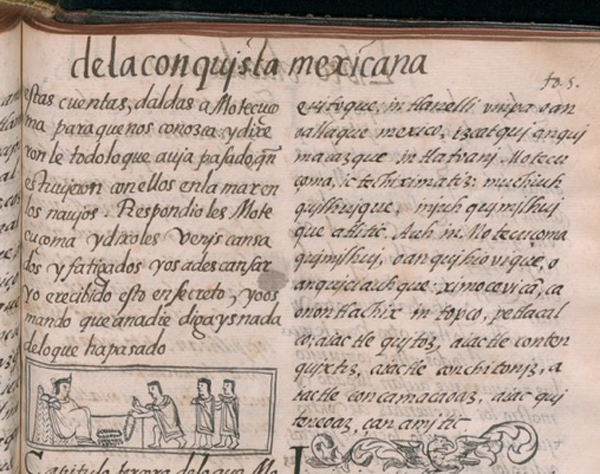 |
[Transcription of the Nahuatl (right-hand column) by James Lockhart:]
[f. 5r.] Quitoque; intla nelli vmpa oanoallaque mexico, iz catqui anquimacazque in tlatoani Motecuçoma, ic techiximatiz: much iuh quilhuique, in iuh quimilhuique atl itic.
Auh in Motecuçoma quimilhui, oanquihiovique, oanquiciauhque: ximocevicā, ca onontlachix in topco, petlacalco: aiac tle quitoz, aiac tle contenquixtiz, aiac tleconchitoniz, aiac tle concamacaoaz, aiac quiteneoaz, çan amitic.
|
[Translation of the Nahuatl (right-hand column) by James Lockhart:]
They said, 'If you have really come from Mexico, here is what you are to give to the ruler Moteucçoma, whereby he will recognize us.'" They told him everything [the Spaniards] had told them out on the water.
And Moteucçoma said to them, “You are doubly welcome; take your rest. What I have seen is a secret. No one is to say anything, to let it escape from his lips, to let a word slip out, to open his mouth, to mention it, but it is to stay inside you.”
[Translation of the Spanish (left-hand column) by James Lockhart:]
are these beads; give them to Moteucçoma so that he will know us."' And they told him everything that had happened when they were with them in the ships on the sea.
Moteucçoma replied, saying to them, "You come tired and worn out; go and rest. I have received this in secret; I order you not to say anything to anyone about what has happened."
|
[Translation of the Nahuatl into Spanish by Fr. Bernardino de Sahagún; transcription of the Spanish (left-hand column) by James Lockhart:]
[f. 5r.] estas cuentas daldas a Motecuçoma para que nos conozca: y dixeronle todo lo que auia pasado, q̄n̄* estuuieron con ellos en la mar en los nauios.
Respondioles Motecuçoma y dixoles Venis cansados y fatigados yos a descansar yo e recibido esto en secreto, yo os mando que a nadie digays nada de lo que ha pasado
----------
*Q̅N̄. For "quando."
|
